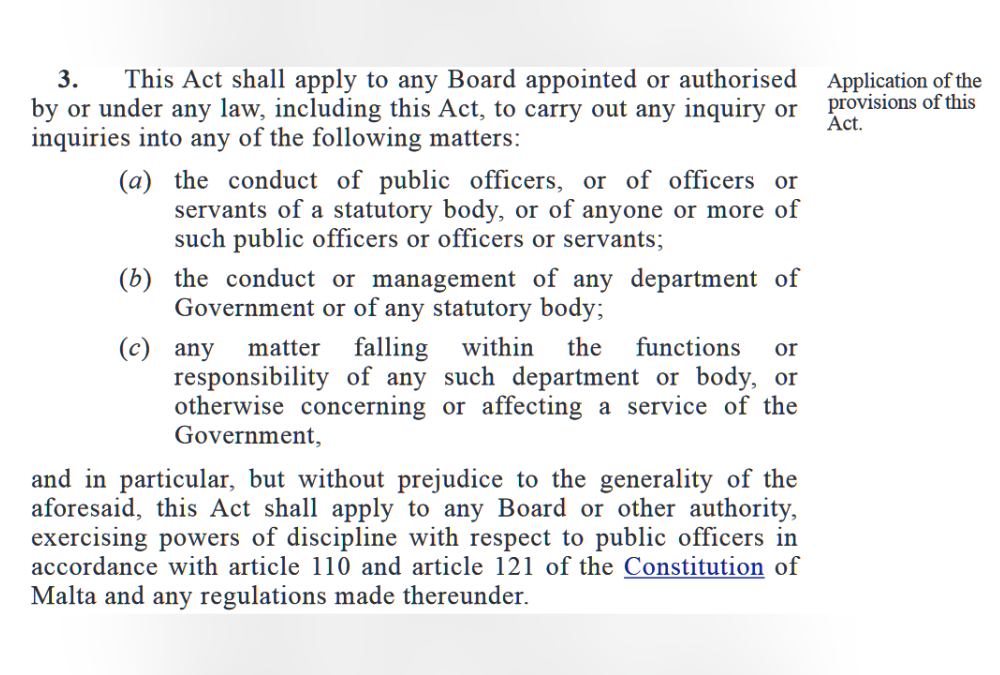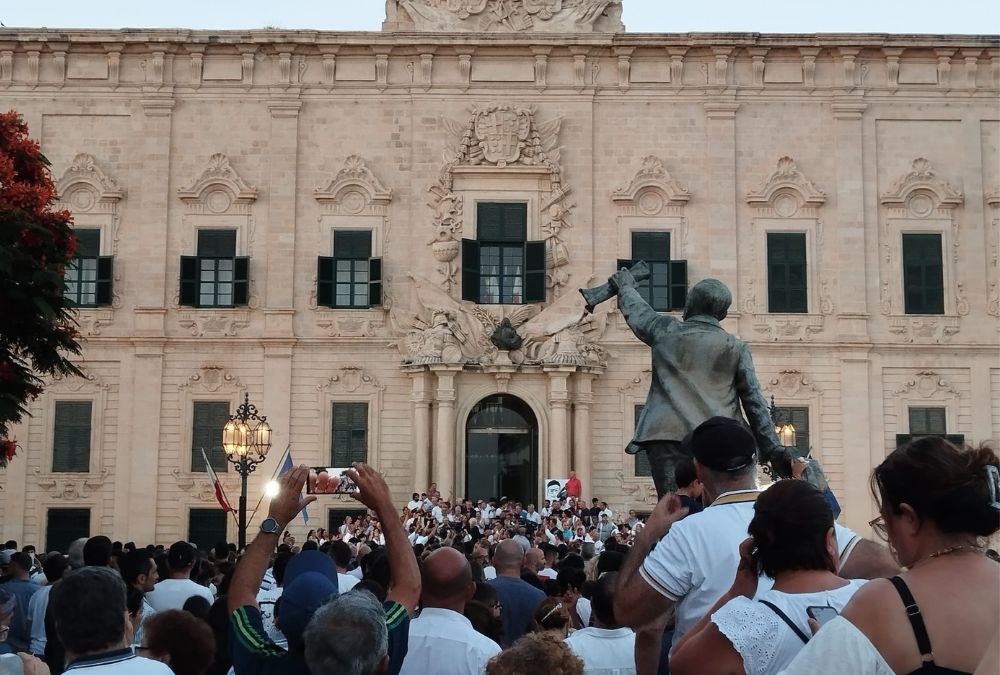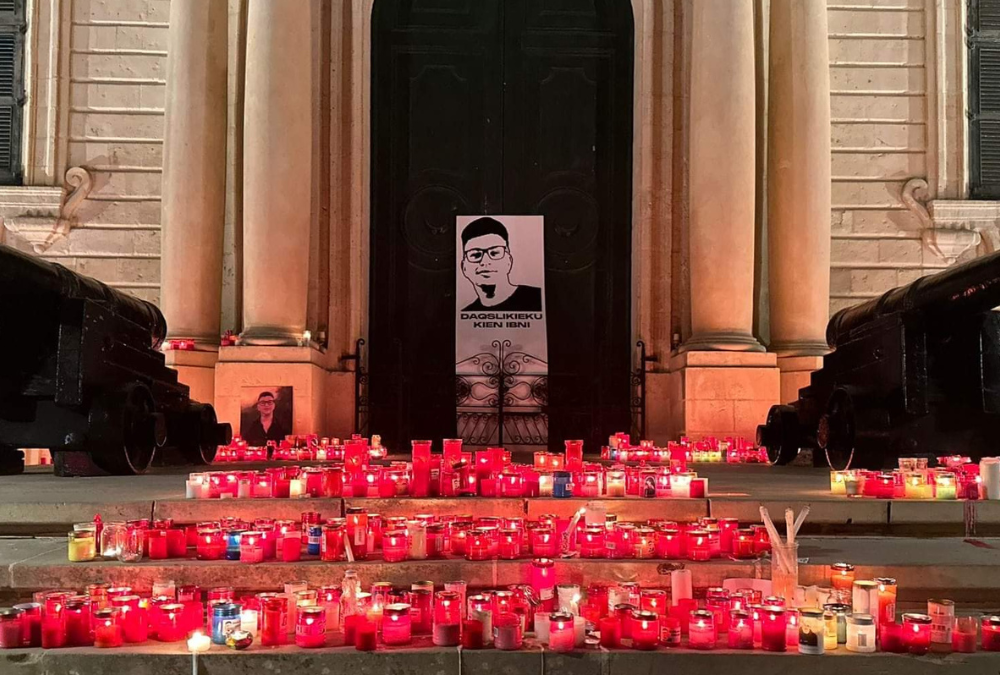On Monday, newspapers officially broke the story about the imminent publication of the Jean-Paul Sofia public inquiry board’s report.
Before delving into the details, it is important to note that this is the second time an inquiry of this kind was ever held in Malta. The momentousness of that fact is often understated: public inquiries are meant to be an exceptional mechanism that is to be deployed only when state failures are apparent.

Applications of the provisions of Chapter 273 of the Laws of Malta, the Inquiries Act.
In other words, the Labour government that swept to power eleven years ago – and no, disgraced former prime minister Joseph Muscat passing the baton to his disgraceful successor Robert Abela does not count as a change of administration – is directly responsible for the failures which established the need for two sweeping inquiries tasked with determining just how bad those failures were.
While we will only know what the Jean-Paul Sofia public inquiry board’s conclusions are when they are published, the information which emerged out of the inquiry hearings which commenced in August of last year indicates that the report they are going to publish is going to be a damning one.
It is important to remember that, in the case of the involuntary homicide of Jean-Paul Sofia, the responsibility does not solely lie with the convicted human trafficker turned Lands Authority chauffeur who was involved in the development through his ties with his business partner, nor does it stop at the shoddy workplace practices that were unearthed on the site. The factory was being built on government land and was even funded by the state through a grant awarded by Malta Enterprise. It is through these two facts that this becomes a matter of wider public interest.
While it becomes tiresome to do so in what should be plainly described as a mafia state, I must point out that the official documentation which was submitted in order for land and funding to be allotted to these developers should have triggered alarm bells, not approvals. If this was a functional democracy rather than a mafia state, someone like Kurt Buhagiar and his associate Matthew Schembri would have been quickly whisked away in a squad car for an unfriendly chat with the police commissioner rather than given state resources which they were not qualified for.
From testimonies given by the relevant government authority representatives who were somehow linked to the project itself – including representatives from the Lands Authority, Malta Enterprise, INDIS Malta, the Building and Construction Authority, the Planning Authority, the Occupational Health and Safety Authority, and the Malta Competition and Consumer Affairs Authority – it is evident that there was absolutely no oversight on whether works were being carried out in conformity with the law.
Perhaps one of the most surreal moments of the inquiry occurred when former head of the Building and Construction Authority (BCA) Michael Ferry effectively contradicted three of his peers within the authority when he pointedly told the judges that the BCA did, in fact, have the necessary legal standing to regulate free-standing structures such as the one that claimed Sofia’s life when it collapsed. Previously, BCA CEO Jesmond Muscat, former BCA CEO Karl Azzopardi, and former BCA chairperson Maria Schembri Grima (the same architect who works for notorious developer Joseph Portelli) had denied that the BCA was responsible for the monitoring of such structures.
It is clear beyond any reasonable doubt that the government has deliberately either gutted institutions which are meant to regulate Wild West industries or has otherwise failed to prioritise the kind of proper funding which is required for regulatory and enforcement authorities to be able to do their jobs adequately.
In one of the most salient court hearings from the entire public inquiry, criminal lawyer and former Nationalist Party MP Jason Azzopardi had highlighted one of the major obstacles in this regard when he testified about how Cabinet actively blocked legislation meant to regulate contractors prior the last general elections in 2022, effectively cutting off legislative firepower that would have helped bring rogue contractors in line and made the BCA more effective.
When one looks at what was unearthed thanks to the work of the public inquiry board and the tenacious resistance put up by Isabelle Bonnici in the face of a stubborn, heartless government that failed to heed her pleas until she brought thousands of people to the prime minister’s doorstep, it is hard to avoid drawing parallels with the only other public inquiry that ever occurred in Malta.

A photo of the crowd which attended the vigil held in memory of Jean-Paul Sofia on 17 July, 2023. Photo: Għal Jean Paul Facebook page
The extensive report published by that public inquiry board outlined the state’s leading role in enabling a climate of impunity and how that climate facilitated the dehumanisation, isolation, and subsequent murder of Daphne Caruana Galizia. The dozens of testimonies which formed the basis of that report – all of which can be found in our data library – featured a number of unmistakable similarities with the Jean-Paul Sofia inquiry.
Most government officials, including high-ranking members of Cabinet, endeavoured to either pass the buck to someone else, downplayed their own personal involvement in the corruption scandals which occurred on their watch, pleaded ignorance, or otherwise claimed their memory has suddenly deserted them. The Jean-Paul Sofia inquiry was no different.
Key civil servants and public officials who were directly responsible for ensuring the state operated in a lawful and ethical fashion contradicted each other’s testimonies, with the hearings featuring multiple instances in which witnesses such as former head of the economic crimes unit Ian Abdilla had to be recalled for further questioning after other witnesses shed further light on events which were under the court’s microscope. The Jean-Paul Sofia inquiry was no different.
Similarly, the more earnest among these civil servants and public officials – many of whom were, more often than not, eventually removed from their positions or otherwise resigned themselves – were keen to shed light on how even in spite of their best efforts to effectively police their regulatory domains, their biggest obstacle was almost always the lack of resources and political backing to do so. Yet again, the Jean-Paul Sofia inquiry was no different.
We must not allow the fruits of the labour of another public inquiry to go to waste. The Daphne Caruana Galizia public inquiry board’s recommendations remain coated in the thick layer of dust they’ve been gathering since the government effectively shelved them shortly after they were published.
On Wednesday, we will be reaping the rewards of another hard-earned victory in the corrupt wasteland that is our political landscape. While justice minister Jonathan Attard stated that the report will be immediately debated in Parliament and that ‘works will commence to ensure that the final recommendations based on the findings of the inquiry will be implemented’, the fact is that the Labour Party is a totalitarian monster cannot be trusted with anything.
If you need any proof of that, just look at this visceral reminder of how disgusting Jason Micallef is. He is the walking embodiment of everything that is wrong with the Labour Party, and his comments in Repubblika president Robert Aquilina’s regard are representative of how the Labour Party is not even capable of considering the possibility that their time-honoured strategy of relentlessly decimating their harshest critics is not an approach that befits a society that purports itself as a democracy.
Ahead of an election year which will be crucial to determining the public’s level of tolerance for the Labour Party’s ongoing assault on the building blocks of a stable, livable society, we must remember that a public inquiry on its own, no matter how damning its findings or recommendations may be, will not address the dense, endemic corruption that infests our country.
The only real power we have is to do everything we can to ensure that those recommendations become law, not just on paper, but in practice.
The only real power we have is to do everything we can to ensure no other family has to endure what the families of Daphne Caruana Galizia and Jean-Paul Sofia had to endure.
The only real power we have is to care about one another enough to fight for a better Malta.
